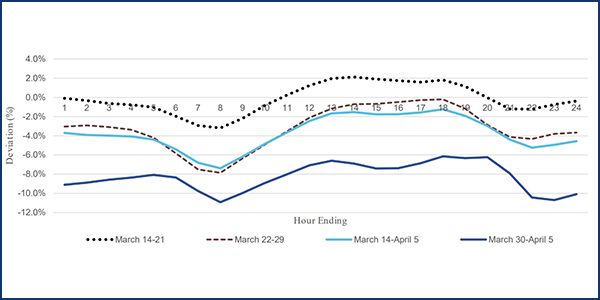By Amanda Durish Cook
The MISO footprint sank deeper into the COVID-19 twilight zone in early April, with demand flattening further and some maintenance outages frozen until some semblance of normalcy is restored.
As the coronavirus pandemic wears on, the RTO is experiencing lower loads that no longer follow a sharp uptick in demand in the morning or evening. MISO said the usual morning peak at about 9 a.m. has given way to a gentler bump in demand around noon that holds steady until the evening, when it gradually drops off. (See MISO Deepens Insights into Pandemic Impact.)
But MISO now says the slight morning and evening bumps have become even flatter in early April.
“The evening peak is now almost nonexistent,” MISO Director of Central Region Operations Ron Arness told stakeholders on a Market Subcommittee teleconference Thursday. “As people started staying home more, we began to see a shift in our load profile. … But then as we got into further restrictions and less activity in more and more areas in the country, we started to see a bigger deviation.”
MISO’s deviation from its historical load trends currently stands at about 8% for the first week of April.
“We continue to track it,” Arness told stakeholders. “We see that load continues to tweak down.”
Arness said MISO South so far is the least impacted by different load shapes during the pandemic.
Independent Market Monitor David Patton said his analysis of the impacts are “on the same page” as MISO’s.
Skeleton work crews at some generation and transmission sites continue to delay some planned maintenance outages, Arness reported. MISO continues to assert that outage delays and reschedules aren’t a threat to reliability.
MISO said it has received 33 requests to move or cancel planned transmission outages since the pandemic took hold, representing about 10% of planned transmission outages. Arness said only some of those reschedules are related to COVID-19 restrictions. Half the outage reschedules will be moved to May and the first part of June; the other half have been canceled.
On the generation side, 30 generator outages representing about 16 GW will be moved from their original dates; all are pandemic-related. Arness said about a third of these will be rescheduled in the fall; another third are “still determining their reschedule plans.”
Arness said MISO is working with transmission and generation owners to reschedule outages, being careful to avoid clustering them around the summer peak.
“Again, we don’t see any big alarms when the COVID-19 [emergency] lifts,” Arness said, adding that MISO has seen “very few” reschedules to June.
“It is a dynamic situation, and we’ll continue to monitor it,” he added.
Stakeholders asked if MISO might become jammed up with outages come fall. Arness said he’s discussing the possibility with the RTO’s outage coordination team.
Stakeholders also asked if MISO would grant amnesty to members that violate the 120-day outage notice requirement because of the pandemic-related scheduling. Arness said members should contact their assigned outage coordinators to discuss their rescheduling needs.





